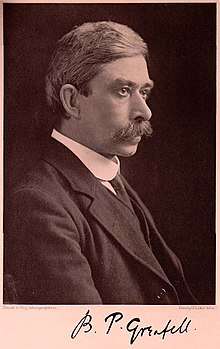Bernard Pyne Grenfell
Bernard Pyne Grenfell, FBA (16 December 1869 – 18 May 1926) was an English scientist and Egyptologist.

Life
Grenfell was the son of John Granville Grenfell FGS and Alice Grenfell. He was born in Birmingham and brought up and educated at Clifton College in Bristol, where his father taught. He obtained a scholarship in 1888 and enrolled at The Queen's College, Oxford.[1]
With his friend and colleague, Arthur Surridge Hunt, he took part in the archaeological dig of Oxyrhynchus and discovered many ancient manuscripts known as the Oxyrhynchus Papyri, including some of the oldest known copies of the New Testament and the Septuagint. Other notable finds are extensive, including previously unknown works by known classical authors. The majority of the find consists of thousands of documentary texts. Parabiblical material, such as copies of the "Logia (words) of Jesus" were also found.
In 1895, Grenfell and Hunt were the first archaeologically to explore the site of Karanis (present Kom Aushim) in Fayum.
His mother, Alice Grenfell, was living with him after his father died in 1897. She took a great interest in Egyptian Scarab shaped artifacts. She taught herself to read hieroglyphics. She published her own papers and a catalogue of the scarab collection belonging to Queen's College.[1]
In 1908, he became Professor of Papyrology at Oxford and was part of the editing team of The Oxyrynchus Papyri and other similar works. However he was ill for four years and during that time the professorship lapsed. Grenfell was cared for by his mother and he had recovered by 1913.[1]
He died on 18 May 1926, and was buried in Holywell Cemetery, Oxford.[2]
Publications
- B. P. Grenfell and A. S. Hunt, Sayings of Our Lord from an Early Greek Papyrus (Egypt Exploration Fund; 1897).
- B. P. Grenfell, A. S. Hunt, and D. G. Hogarth, Fayûm Towns and Their Papyri (London 1900).
See also
References
- Bell, H. (2004-09-23). Grenfell, Bernard Pyne (1869–1926), papyrologist. Oxford Dictionary of National Biography. Retrieved 18 Jan. 2018, See link
- Bell H I, 'Bernard Pyne Grenfell'. Archived February 26, 2010, at the Wayback Machine In JRH Weaver (ed.). Dictionary of National Biography 1922 - 1930. Oxford University Press
External links
| Wikimedia Commons has media related to Bernard Pyne Grenfell. |
- Bell HI. 'Bernard Pyne Grenfell'. In JRH Weaver (ed.). Dictionary of National Biography 1922 - 1930. Oxford University Press.
- The Oxyrhynchus papyri, edited with translations and notes by Bernard P. Grenfell and Arthur S. Hunt (Part 10) Cornell University Library Historical Monographs Collection, reprinted by Cornell University Library Digital Collections